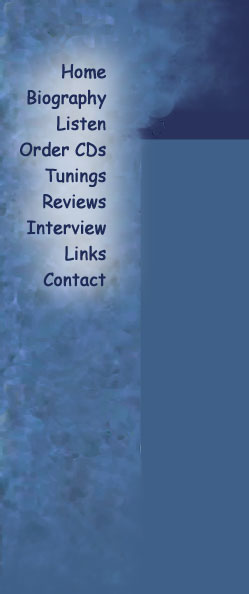

John Beaudin: I never tire of great acoustic guitar music. Whom did you listen to when you were a kid?
Martin Posen: I didn't listen to guitar players until I was in my mid-teens. I grew up listening to the radio in the 60's; the Beatles, Rolling Stones and the rest of the' British invasion' bands and the California-based bands like the Beach Boys, The Byrds, Buffalo Springfield, etc. My eldest brother was heavily into folk music so recordings of the Weavers, Pete Seeger and Bob Dylan were around, while my other brother was a serious guitar student for a while. So, in my mid-teens I was listening to the likes of Doc and Merle Watson, Robert Johnson and Lonnie Johnson, just to name a few.
Michael Hedges and Will Ackerman were probably the first two guitarists to really make me take notice of the genre. Has the Windham Hill sound influenced you?
Michael was my main influence from the Windham Hill group of guitarists. but Michael was a presence and influence in my life long before he was signed to Windham Hill. We met at the National Music Camp in Interlochen, Michigan when we were both teenagers, and we spent a lot of time together after that. He was just beginning to write solo guitar pieces at the time that I met him in Michigan.
I hear that 'hammer on' technique in your guitar playing. How long have you been doing it?
The instrumental 'Listening Hands' actually had its roots in the mid 1980's, so I've been aware and utilizing that technique for some time now. 3 Portals and 3 Keys is a more intricate example of right hand 'hammer on' and pull offs.
You placed as a top ten finalist at the National Flatpicking Championship in Winfield, Kansas when you were 21; that must have been cool! Do you remember any of the other guitarists in the competition, and are they still around?
The only person I remember was an amazing musician, who was 13 or 14 years old at the time, by the name of Mark O'Connor. I remember he flatpicked an incredible version of 'Dixie Breakdown.' I believe he was the National Flatpicking and National Fiddle Champion that year.
I noticed Don Ross gave you a pretty nice quote on your first album. How long have you known him?
In the mid- to late-1980's I was talking to Michael Hedges on the phone and he told me he was sending some of my music to Windham Hill along with another guitarist from Toronto called Don Ross. I looked Don up and we've been friends ever since.
Don's a great guy and I haven't heard from him in a while. I always look forward to anything he releases.
Don has been extremely helpful to me (and a host of other guitarists, I'm sure). He has given me technical advice about live stage sound and recording suggestions as well as general advice about the music business. I'm looking forward to his next release to see what direction he's traveling in.
Commercial radio is not always generous to your genre of music. How has it been for air play in North America?
The reception for both CD's has been wonderful! My music is being played by Folk and New-Age DJ's in Canada and the U.S., and CBC radio has also been extremely supportive.
How often do you practice?
I don't have a practice schedule per se. I try to practice when the spirit moves rather than set up a routine, although before gigs I do set up a schedule for myself. Currently, I'm working on my newer material trying to refine and articulate them better.
What's your process for writing? Can you write on cue anytime, or do you have to be in the zone?
The creative process is so fascinating to me, John. There is usually an initial spark, whether it's a dream, or being inspired by a person, or moved by nature, etc. It's always easier for me to compose when I'm in that space. If the piece of music isn't completed by the time the inspiration fades, I have to try to recall that feeling in order to resume the process. So, yes, I prefer to be in the zone. It gives music more depth of feeling.
What did you learn after 'Triple Heater' that helped you on 'Listening Hands'?
Most of the learning came in the actual recording of 'Triple Heater.' I was new to the process of recording solo where you have to be so precise because the sound is so exposed and there is nowhere to hide. I was also intimately involved in the mixing and mastering process which was a new experience for me. In recording 'Listening Hands' I recorded with semi flat wound strings to minimize fret noise and I also made use of my two stereo pickups as well as two microphones so that I could alter and vary the guitar sound.
martinposen.com © 2003